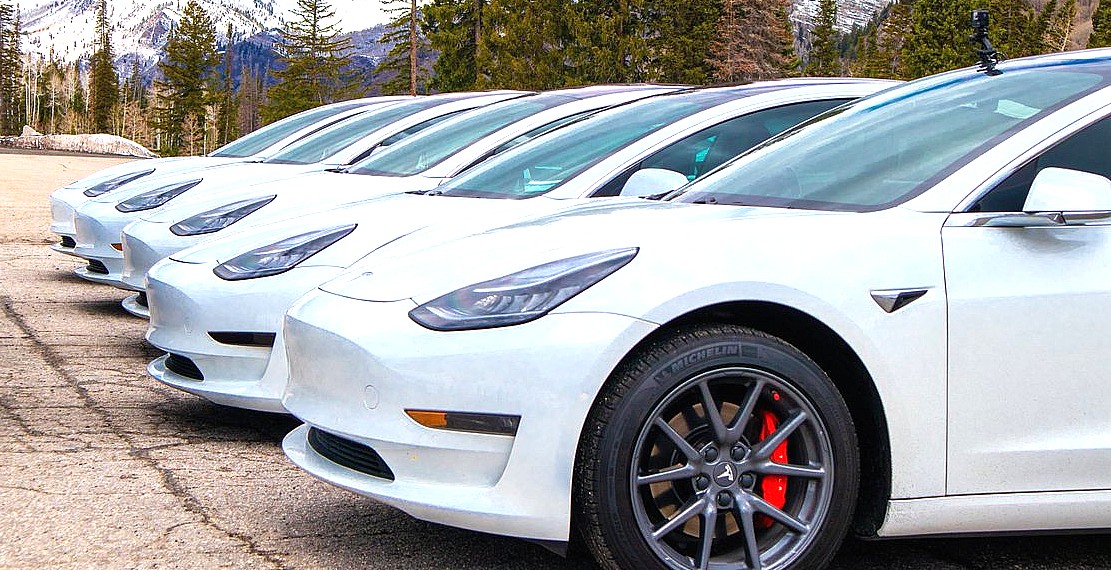
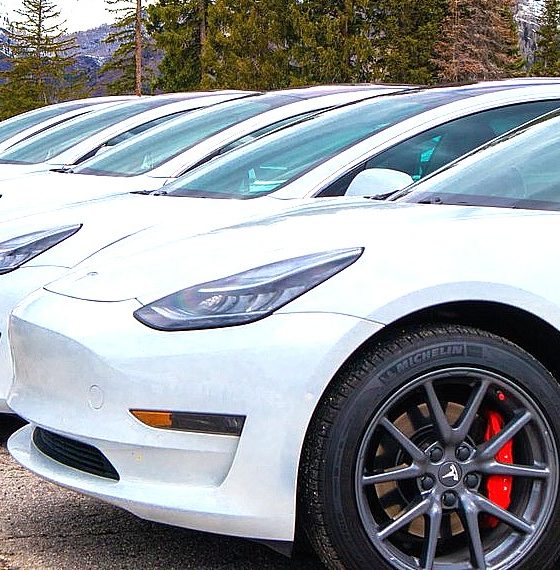
News
Tesla Model 3 tops survey for the world’s most searched-for electric car
A recent study from a Compare the Market, a UK-based price comparison company, has determined that the Tesla Model 3 is currently the world’s most searched-for all-electric vehicle in the world. Following behind the Model 3 was longtime EV veteran Nissan Leaf, as well as Tesla’s two other cars, the Model S and the Model X.
The UK-based firm’s study utilized Google search data to determine the most popular search term for each electric vehicle on the market and compare each car’s popularity across the globe. The survey’s figures are exclusive only to searches of battery-electric cars, as hybrids, plug-in hybrids, and hydrogen vehicles like the Toyota Mirai were not included in the survey.
According to Compare the Market’s results, the Tesla Model 3 is the overwhelming winner worldwide, being the most-searched-for EV in 54.7% of search traffic surveyed. That accounts for more than half of the 136 countries covered in the study. It should be noted that the gap between the Model 3 and the study’s second placer, the Nissan Leaf, was notable as well, with the Japanese-made EV leading in 16.1%, or 22 countries across the globe.
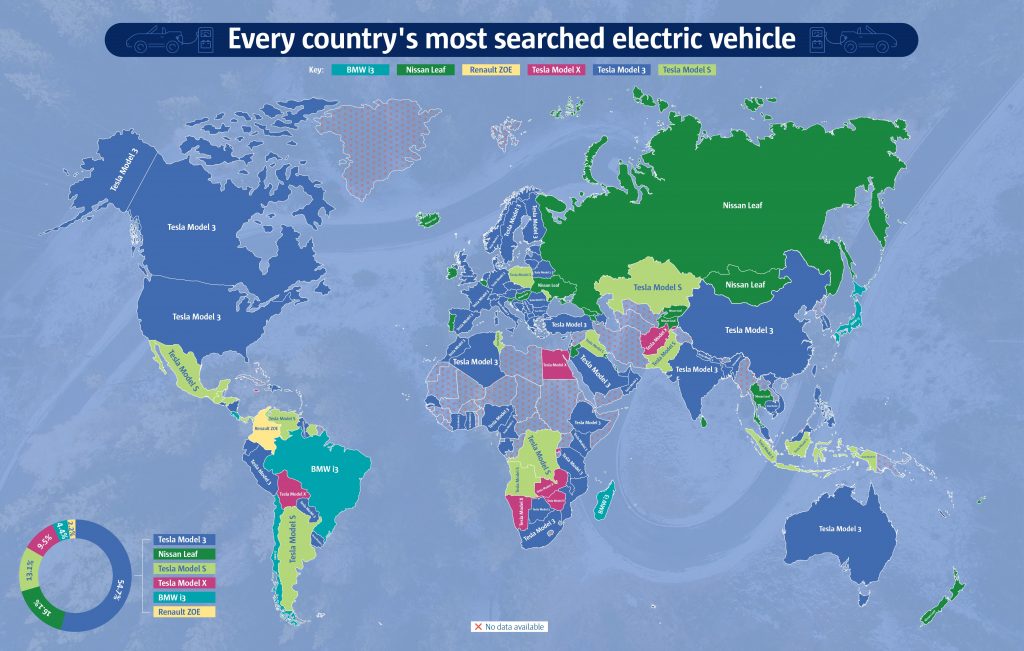
The Tesla Model S and Model X were the study’s 3rd and 4th placers, leading the rankings in 13.1% and 9.5%, taking of the search traffic surveyed. Overall, Tesla’s electric car lineup dominates internet searches for all-electric vehicles in 77.3% of the countries surveyed by the UK-based firm.
Apart from the Nissan Leaf, other non-Tesla vehicles that proved popular in Google searches were the BMW i3 (4.4%), and the Renault Zoe (2.2%). Other premium EVs such as the Jaguar I-PACE, the Audi e-tron, and the Mercedes EQC did not rank in the survey.
The study’s results become quite interesting when they are broken down by country. The Model 3 held a clean lead in a number of the world’s key auto markets, such as the United States, China, most of Europe, and even India, a country that is yet to see its first Tesla store. The Nissan Leaf dominated in Russia, while the Tesla Model S received the most search traffic from Mexico and Argentina. The BMW i3 even proved particularly popular in Brazil.
Interestingly, the study shows that the rankings didn’t necessarily align with the national origins of a particular vehicle. In Japan, for example, it was the BMW i3, a German car, that dominated internet searches. Germany, the home of the BMW i3, displayed strong interest for an American all-electric car, the Tesla Model 3.
Considering the hype and the close news coverage that follows Tesla’s electric car lineup, it is rather unsurprising to see the Model 3 dominating in the UK-based firm’s study. What is particularly notable was that even with the Model 3 taking most of the spotlight, Tesla’s Model S and Model X, which have already been in the market for years, ranked highly in the survey nonetheless. This shows that Tesla has become a brand that is perceived as a premier maker of EVs across the globe, even in areas where it is yet to begin selling its vehicles.
Part of Tesla’s secret sauce for its vehicles’ popularity lies in the company’s strong online presence, which it grows through organic engagement in social media. This was highlighted by a study from competitive intelligence analysis firm BrandTotal, which noted that Tesla, despite investing $0 in paid advertising on social media platforms, is the car company with the strongest social media presence. “Strong brands are able to command high engagement even without a robust digital ad spend. In Tesla’s case, we see their engagement numbers are high compared to other auto brands allocating spend in their digital campaigns,” Alon Leibovich, co-founder & CEO of BrandTotal, said.

News
Tesla FSD (Supervised) fleet passes 8.4 billion cumulative miles
The figure appears on Tesla’s official safety page, which tracks performance data for FSD (Supervised) and other safety technologies.

Tesla’s Full Self-Driving (Supervised) system has now surpassed 8.4 billion cumulative miles.
The figure appears on Tesla’s official safety page, which tracks performance data for FSD (Supervised) and other safety technologies.
Tesla has long emphasized that large-scale real-world data is central to improving its neural network-based approach to autonomy. Each mile driven with FSD (Supervised) engaged contributes additional edge cases and scenario training for the system.
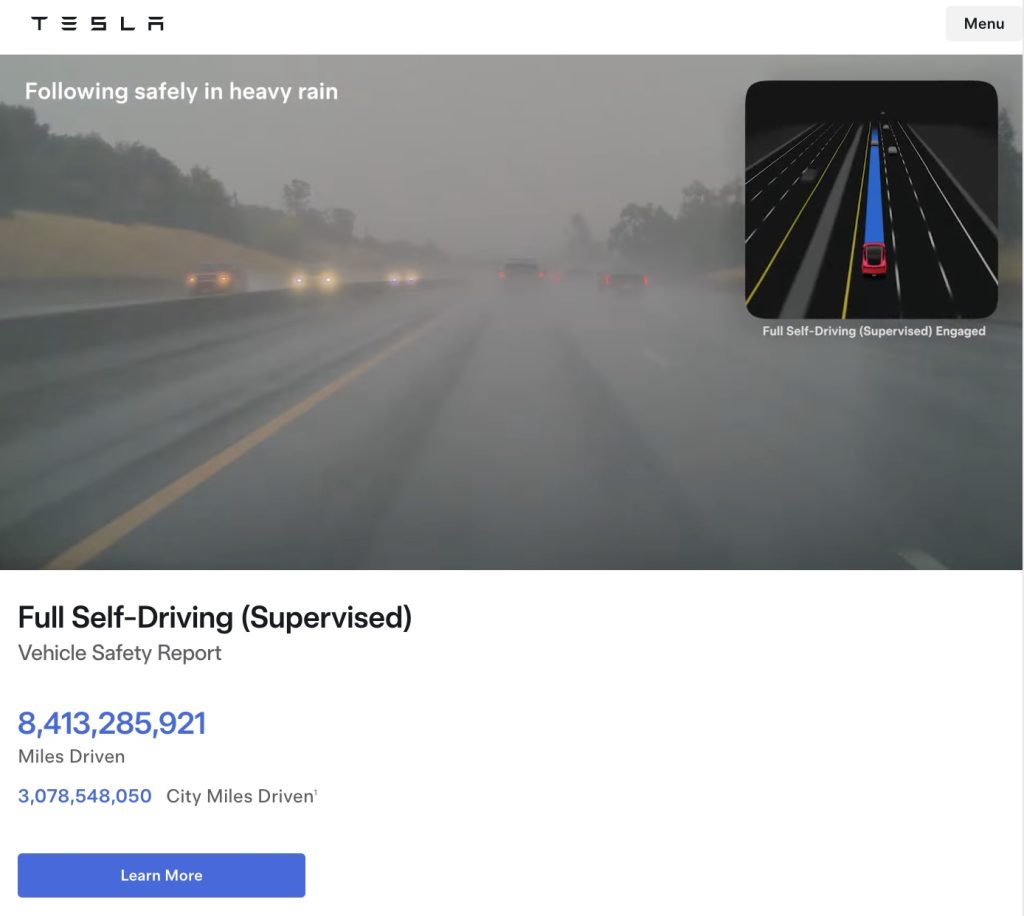
The milestone also brings Tesla closer to a benchmark previously outlined by CEO Elon Musk. Musk has stated that roughly 10 billion miles of training data may be needed to achieve safe unsupervised self-driving at scale, citing the “long tail” of rare but complex driving situations that must be learned through experience.
The growth curve of FSD Supervised’s cumulative miles over the past five years has been notable.
As noted in data shared by Tesla watcher Sawyer Merritt, annual FSD (Supervised) miles have increased from roughly 6 million in 2021 to 80 million in 2022, 670 million in 2023, 2.25 billion in 2024, and 4.25 billion in 2025. In just the first 50 days of 2026, Tesla owners logged another 1 billion miles.
At the current pace, the fleet is trending towards hitting about 10 billion FSD Supervised miles this year. The increase has been driven by Tesla’s growing vehicle fleet, periodic free trials, and expanding Robotaxi operations, among others.
With the fleet now past 8.4 billion cumulative miles, Tesla’s supervised system is approaching that threshold, even as regulatory approval for fully unsupervised deployment remains subject to further validation and oversight.
Elon Musk
Elon Musk fires back after Wikipedia co-founder claims neutrality and dubs Grokipedia “ridiculous”
Musk’s response to Wales’ comments, which were posted on social media platform X, was short and direct: “Famous last words.”
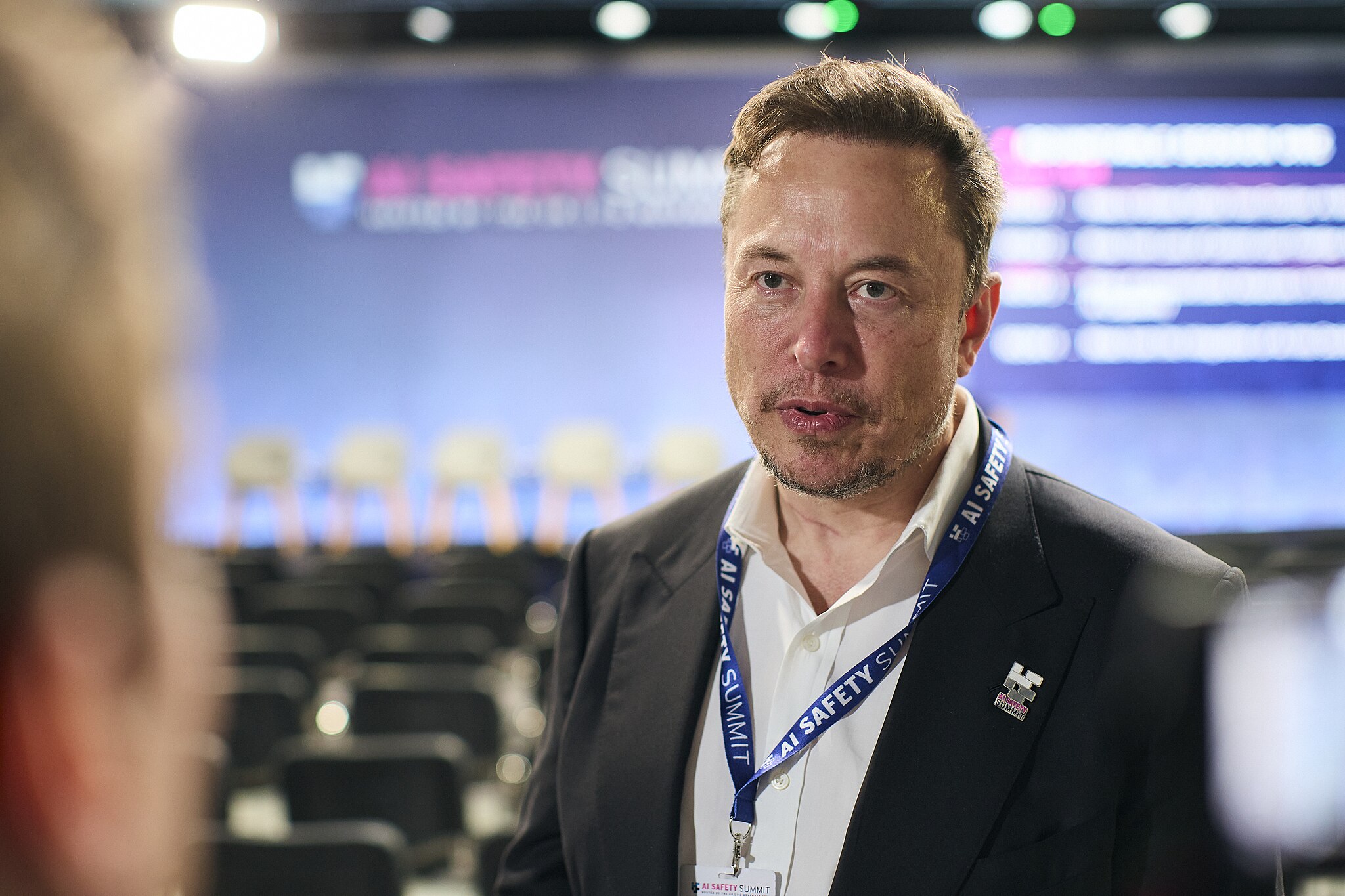
Elon Musk fired back at Wikipedia co-founder Jimmy Wales after the longtime online encyclopedia leader dismissed xAI’s new AI-powered alternative, Grokipedia, as a “ridiculous” idea that is bound to fail.
Musk’s response to Wales’ comments, which were posted on social media platform X, was short and direct: “Famous last words.”
Wales made the comments while answering questions about Wikipedia’s neutrality. According to Wales, Wikipedia prides itself on neutrality.
“One of our core values at Wikipedia is neutrality. A neutral point of view is non-negotiable. It’s in the community, unquestioned… The idea that we’ve become somehow ‘Wokepidea’ is just not true,” Wales said.
When asked about potential competition from Grokipedia, Wales downplayed the situation. “There is no competition. I don’t know if anyone uses Grokipedia. I think it is a ridiculous idea that will never work,” Wales wrote.
After Grokipedia went live, Larry Sanger, also a co-founder of Wikipedia, wrote on X that his initial impression of the AI-powered Wikipedia alternative was “very OK.”
“My initial impression, looking at my own article and poking around here and there, is that Grokipedia is very OK. The jury’s still out as to whether it’s actually better than Wikipedia. But at this point I would have to say ‘maybe!’” Sanger stated.
Musk responded to Sanger’s assessment by saying it was “accurate.” In a separate post, he added that even in its V0.1 form, Grokipedia was already better than Wikipedia.
During a past appearance on the Tucker Carlson Show, Sanger argued that Wikipedia has drifted from its original vision, citing concerns about how its “Reliable sources/Perennial sources” framework categorizes publications by perceived credibility. As per Sanger, Wikipedia’s “Reliable sources/Perennial sources” list leans heavily left, with conservative publications getting effectively blacklisted in favor of their more liberal counterparts.
As of writing, Grokipedia has reportedly surpassed 80% of English Wikipedia’s article count.
News
Tesla Sweden appeals after grid company refuses to restore existing Supercharger due to union strike
The charging site was previously functioning before it was temporarily disconnected in April last year for electrical safety reasons.
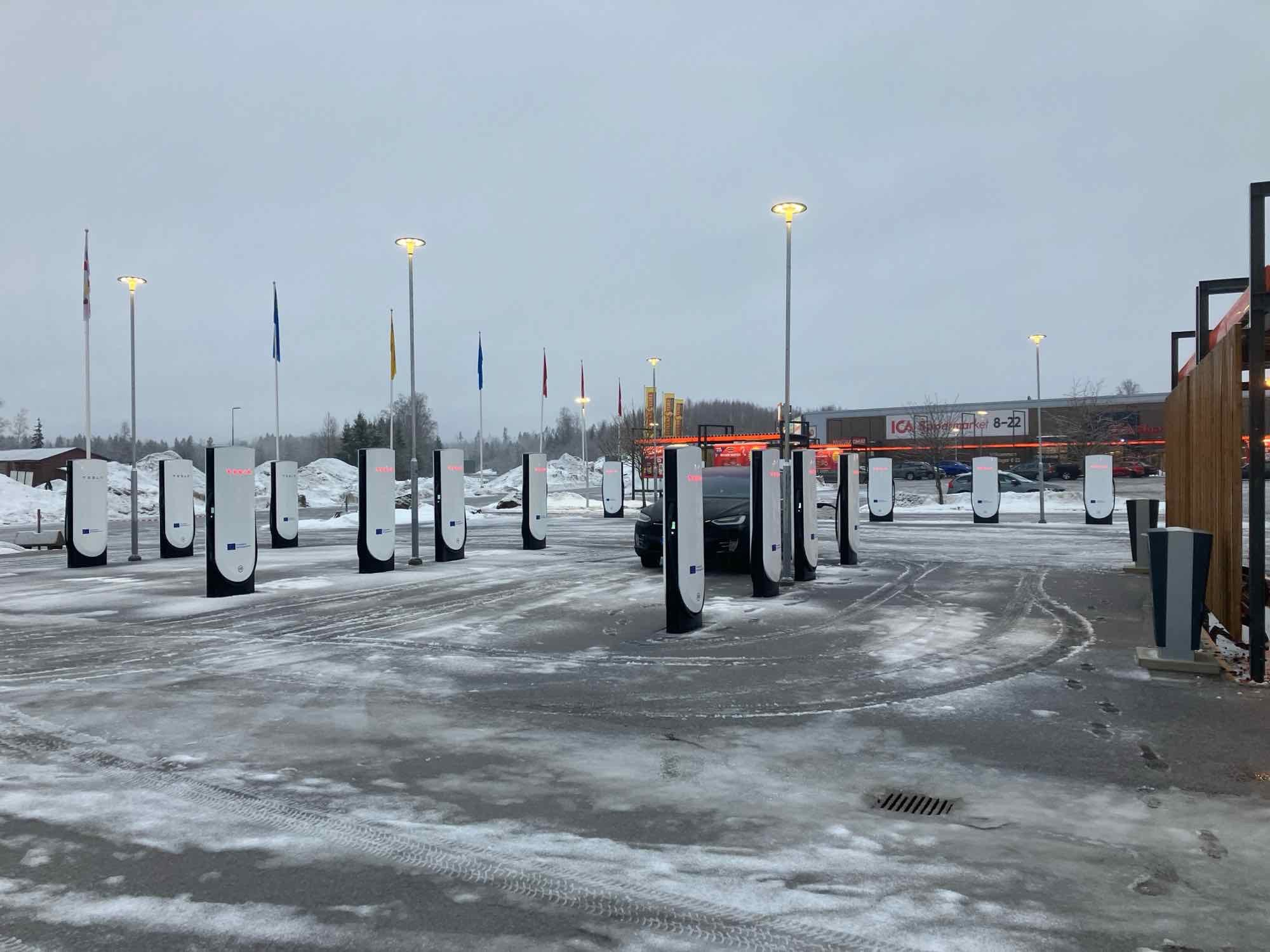
Tesla Sweden is seeking regulatory intervention after a Swedish power grid company refused to reconnect an already operational Supercharger station in Åre due to ongoing union sympathy actions.
The charging site was previously functioning before it was temporarily disconnected in April last year for electrical safety reasons. A temporary construction power cabinet supplying the station had fallen over, described by Tesla as occurring “under unclear circumstances.” The power was then cut at the request of Tesla’s installation contractor to allow safe repair work.
While the safety issue was resolved, the station has not been brought back online. Stefan Sedin, CEO of Jämtkraft elnät, told Dagens Arbete (DA) that power will not be restored to the existing Supercharger station as long as the electric vehicle maker’s union issues are ongoing.
“One of our installers noticed that the construction power had been backed up and was on the ground. We asked Tesla to fix the system, and their installation company in turn asked us to cut the power so that they could do the work safely.
“When everything was restored, the question arose: ‘Wait a minute, can we reconnect the station to the electricity grid? Or what does the notice actually say?’ We consulted with our employer organization, who were clear that as long as sympathy measures are in place, we cannot reconnect this facility,” Sedin said.
The union’s sympathy actions, which began in March 2024, apply to work involving “planning, preparation, new connections, grid expansion, service, maintenance and repairs” of Tesla’s charging infrastructure in Sweden.
Tesla Sweden has argued that reconnecting an existing facility is not equivalent to establishing a new grid connection. In a filing to the Swedish Energy Market Inspectorate, the company stated that reconnecting the installation “is therefore not covered by the sympathy measures and cannot therefore constitute a reason for not reconnecting the facility to the electricity grid.”
Sedin, for his part, noted that Tesla’s issue with the Supercharger is quite unique. And while Jämtkraft elnät itself has no issue with Tesla, its actions are based on the unions’ sympathy measures against the electric vehicle maker.
“This is absolutely the first time that I have been involved in matters relating to union conflicts or sympathy measures. That is why we have relied entirely on the assessment of our employer organization. This is not something that we have made any decisions about ourselves at all.
“It is not that Jämtkraft elnät has a conflict with Tesla, but our actions are based on these sympathy measures. Should it turn out that we have made an incorrect assessment, we will correct ourselves. It is no more difficult than that for us,” the executive said.








